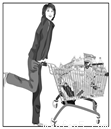题目内容
One day after school I was just finishing up some math homework. My dad came back from work and sat right beside me, ______ over my homework with me. We made corrections _____. After that we _______ and my dad said,” I will always _______ every moment spending time talking with you”.
I remember my Dad telling me his stories of when he was ______. My dad didn't have a father ____. He was always moving from place to place with my ______. My dad wasn't the easiest kid to_____. He would _______ with kids at school, which made my grandma worried. He’d act out to release the anger he had from not having his father present in his ________ and teenage years.
At high school, things got a little ________. He made a football team, he did well and didn’t get into as much _______ as before. He also made many friends. ______ those friends was my uncle. My Dad and Uncle were friends all throughout high school. It was through my uncle _______my Mom and Dad met _________. Later, they got married. After I was born, my dad felt that becoming a _______ was an honor and that he would not be ______ in my life.
I suddenly looked up to see my Dad ______ at me. I could see in my Dad’s eyes how he longed for a _______ like this. I continued to do my math homework and _______ my Dad say,” I love you, always”.
1.A. taking B. looking C. getting D. handing
2.A. equally B. instead C. together D. hardly
3.A. thought B. planned C. listened D. talked
4.A. waste B. organize C. tre asure D. choose
asure D. choose
5.A. young B. old C. tired D. poor
6.A. growing up B. turning up C. settling down D. breaking away
7.A. mom B. uncle C. grandpa D. grandma
8.A. connect B. handle C. change D. recognize
9.A. fight B. dance C. compete D. study
10.A. struggling B. travelling C. childhood D. adulthood
11.A. harder B. easier C. worse D. larger
12.A. trouble B. debt C. sadness D. anxiety
13.A. Between B. Apart from C. Among D. As for
14.A. who B. when C. how D. that
15.A. practically B. officially C. especially D. entirely
16.A. father B. mother C. fighter D. student
17.A. present B. different C. absent D. strict
18.A. glaring B. pointing C. aiming D. smiling
19.A. appearance B. relationship C. background D. behavior
20.A. felt B. found C. heard D. made


